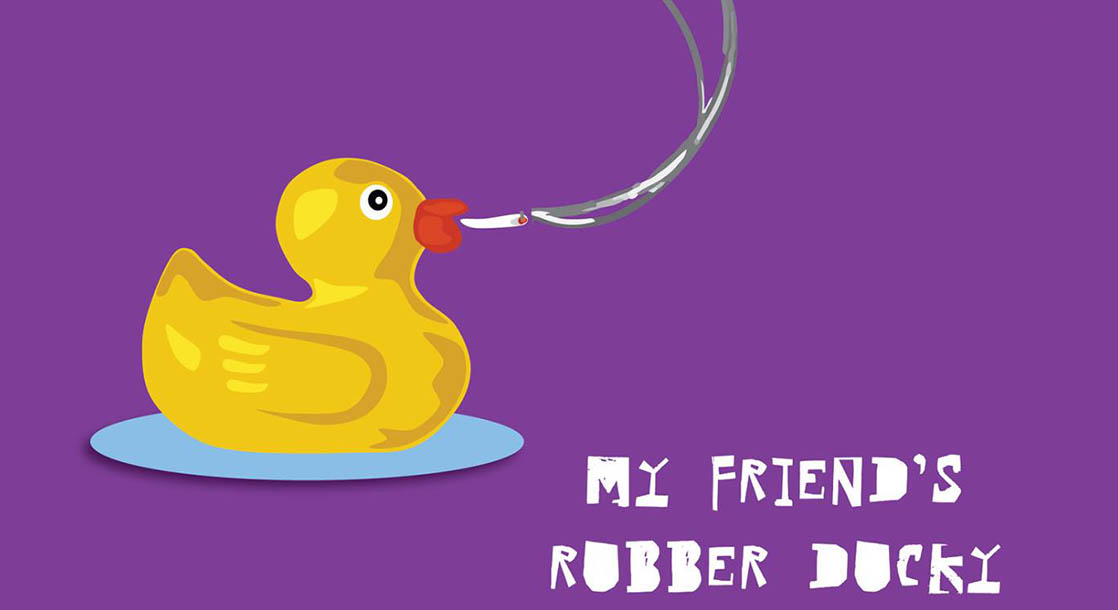Like the Supreme Court’s stance on obscenity, even though I can’t completely put my finger on the magical honeypot that is the perfect stoner film, I know it when I see it.
Drugs and art have been in a “’till death do us part”-level partnership for some time now (hallucinogens and music; cocaine and the art world; literally Dali just as a concept), and stoner cinema is as crucial a contribution as any of the others. The canon vacillates; sometimes, the film’s are about the thing (procuring weed, having to get rid of it, or having to pay someone back for it all feature heavily as plot points); or sometimes, the film captures the general sensibility of highness (The Holy Mountain for fucked-up starters, or Smiley Face as a more recent example).
My Friend’s Rubber Ducky doesn’t really do either. It attempts to fuse the stoner flick with a genre it often finds itself orbiting: an absurdist crime film. The feature is written and directed by Josh Hyde, and stars Jordan Kenneth Kamp as Joseph, who runs into an old college friend, Oliver, while biking through the suburbs of Chicago. Over drinks, Joseph and Oliver reminisce until a confrontation over an old financial loan erupts into a three-day hostage situation. Yet despite billing itself as a stoner film, My Friend’s Rubber Ducky barely telegraphs even a cursory interest in weed beyond its use as a literal prop.
Shot on a shoestring budget, My Friend’s Rubber Ducky takes place pretty much between a single living room and a crowded car, and it captures some of the acute claustrophobia that weed can instigate. As the film’s antics progress, Joseph draws more people into his scheme, including his girlfriend, Mauve (Rinska Carrasco) and his stoner roommate Tee (Alex Hardaway), whose relaxed nature is either the result of potent bud or tai chi, which we see him doing often.
The film’s 4/20 release date (it’s available to stream starting today) is a bit of a misnomer. Weed factors in largely as an afterthought, and more closely resembles set decoration than an essential plot device. Bafflingly, things don’t go all that wrong as the film inches towards its climax, instead presenting the characters’ harebrained scheme as plodding along according to plan. The film as a whole does about the same; its pacing lags and the tone flat lines. It has none of the exuberant silliness or the profound stillness of what being high feels like, and the actual narrative feels ridiculous even for the genre it purports to be apart of.
In a lot of ways, the stoner sensibility has already had its weed-less roots celebrated in the canon of cinema. Mumblecore, in all its homemade slacker glory, always had the vague hazy sheen of cinema on the fringe (that the genre’s other name was “Slackavettes” is no matter). The genre’s naturalness coincided with a kind of day-to-day authenticity that factored weed into the routine. Shows like Broad City and High Maintenance have managed to integrate weed into daily regimen to the point where the drug feels of equal liberal standing as gay marriage. And films like The Big Lebowski lean into the more absurd traditions of both stoner cinema and classic noir. These projects understand weed not just as a plot point, but as a lens or filter with which viewers can share the characters’ worldviews.
My Friend’s Rubber Ducky on the other hand is uninterested in the limitations or textures of both the stoner film genre and crime caper. That’s not to bring profound expectations onto the film; it knows exactly the kind of movie it is and wants to be, but it’s often too satisfied shooting low. The dragging of the third act makes the film’s central tension (if you can call it that) feel like yet another afterthought. The actors aren’t charming enough to hold the flimsy plot on its own, and in another world you could see Seth Rogan and Danny McBride as the lead roommates.
Yet even without Rogan, My Friend’s Rubber Ducky has all the sheen of the actor’s juvenile oeuvre. Man-children trying to lean into their idea of adult responsibility using the petty means of a kid is, after all, a post-Apatow conceit, but here it does little to go anywhere. The film wants to be a comedy of manners, but instead it’s just blowing smoke.
Follow Rod on Twitter











